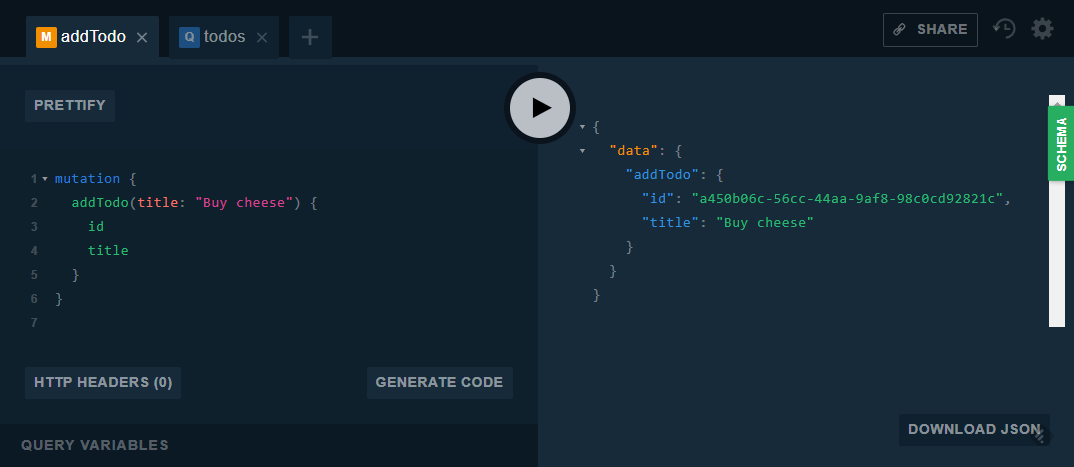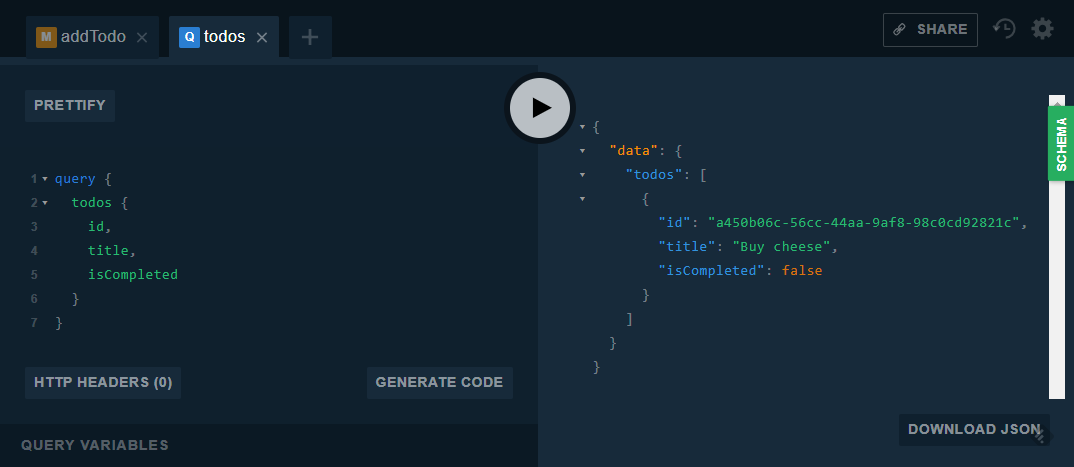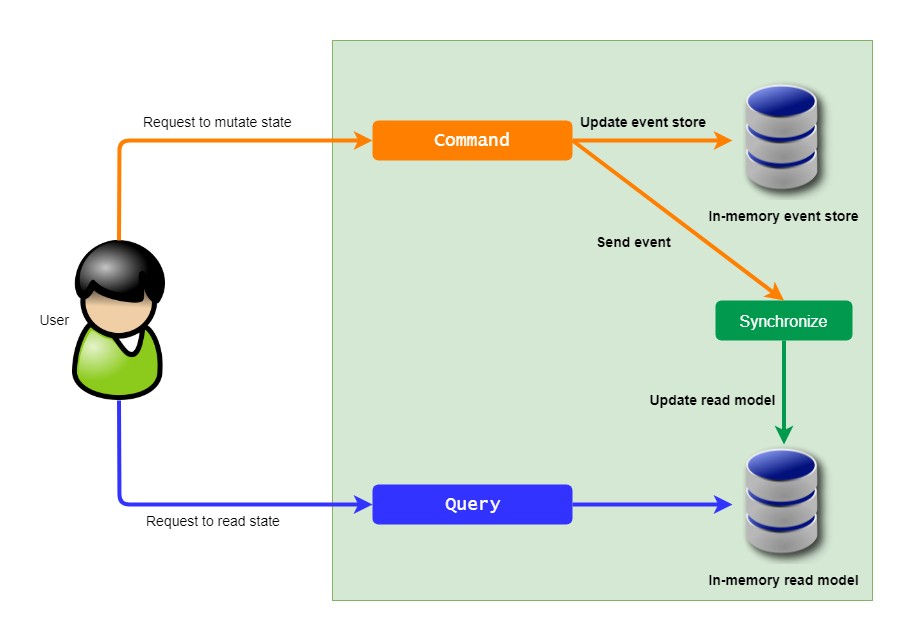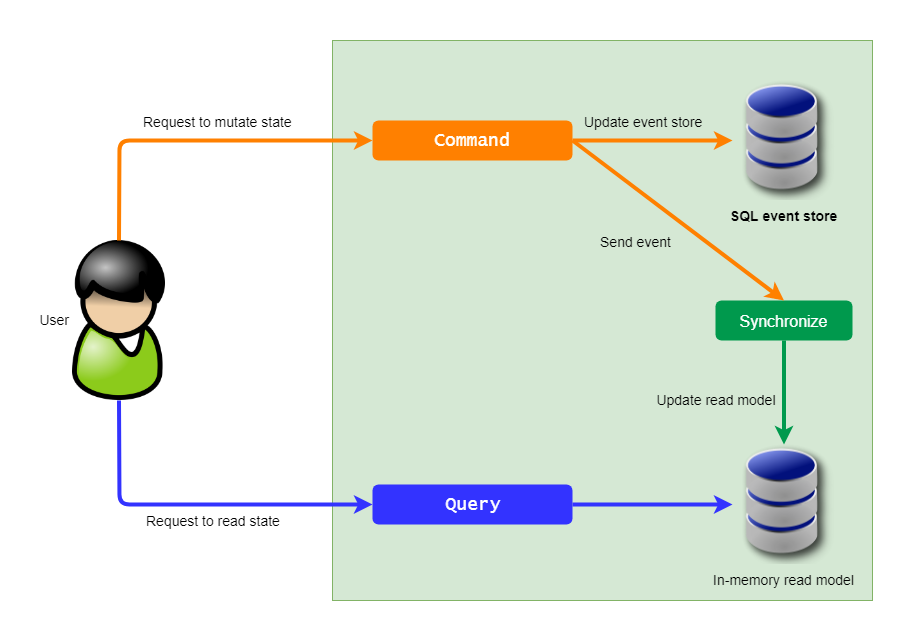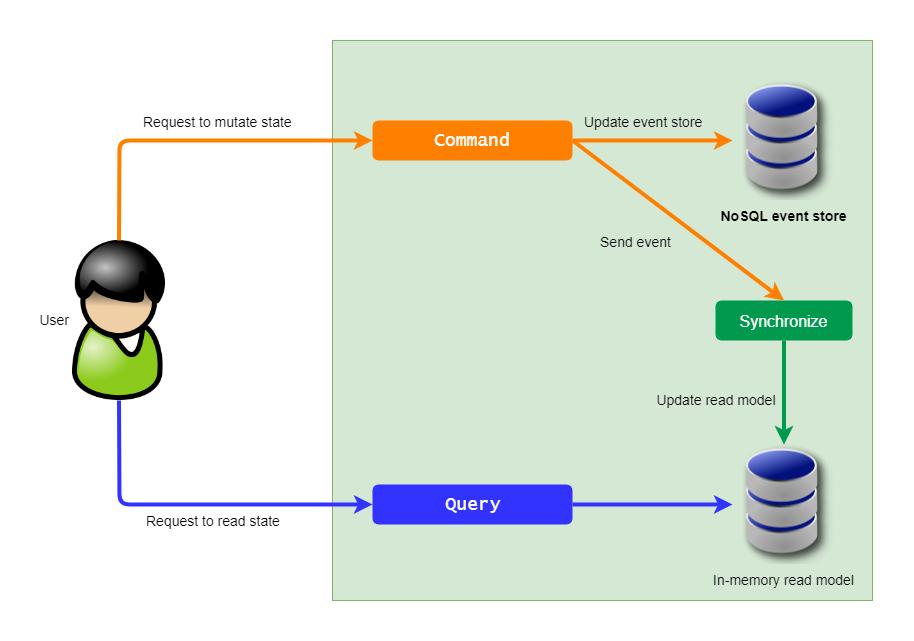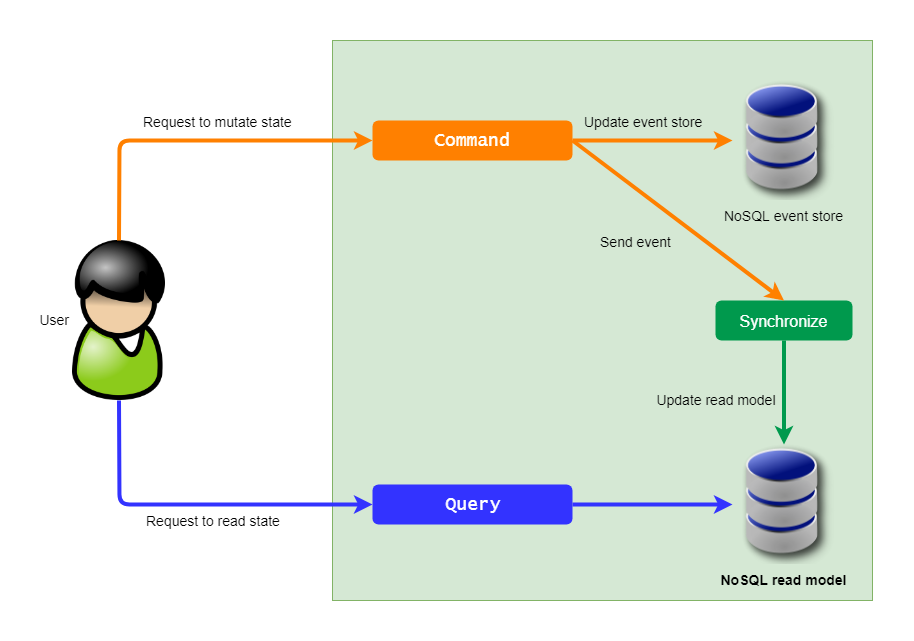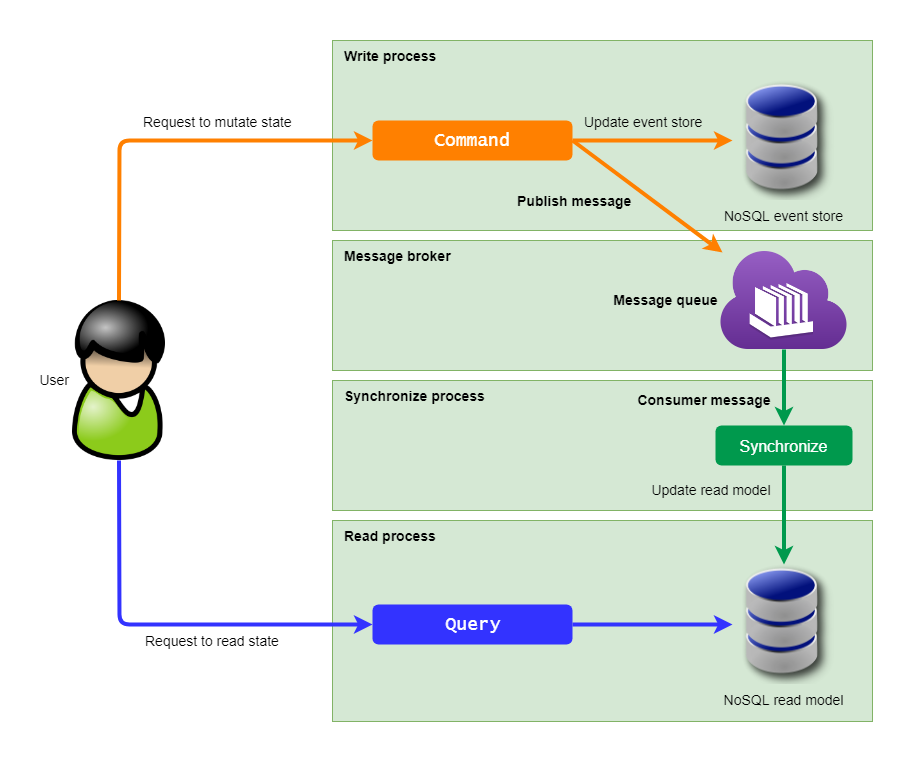TodoCQRS - TodoMVC using CQRS and event sourcing
Table of contents
- Introduction
- What you will end up with
- Acceptance criteria
- Single process using in-memory event store and in-memory read model
- Single process using SQL event store and in-memory read model
- Single process using NoSQL event store and in-memory read model
- Single process using NoSQL event store and NoSQL read model
- Distributed NoSQL event store and NoSQL read model
- What's next
Introduction
This repository contains various implementations meeting the acceptance criteria of TodoMVC, built using CQRS and event sourcing. It starts with a very basic in-memory event store, but then gradually becomes more complex with increasing requirements.
These are the implementations, ordered according to complexity:
- Single process using in-memory event store and in-memory read model
- Single process using SQL event store and in-memory read model
- Single process using NoSQL event store and in-memory read model
- Single process using NoSQL event store and NoSQL read model
- Distributed NoSQL event store and NoSQL read model
- What's next
What you will end up with
All implementations will expose the same GraphQL playground on http://localhost:8080/ui/playground. Using the playground you will be able to query and mutate state using GraphQL, as shown below.
Acceptance criteria
Empty list can have item added
Given an empty Todo list
When I add a Todo for 'Buy cheese'
Then only that item is listed
Empty list can have two items added
Given an empty Todo list
When I add Todos for 'Buy cheese' & 'Wash the car'
Then only those items are listed
Item completion changes the list
Given a Todo list with items 'Buy cheese' & 'Wash the car'
When the first item is marked as complete
Then only those items are listed
And only the second item is listed as incomplete
Item incompletion changes the list
Given a Todo list with items 'Buy cheese' & 'Wash the car'
And the first item is completed
When the first item is marked as incomplete
Then only those items are listed
And both items are listed as incomplete
Incomplete items can be removed
Given a Todo list with a single item 'Buy cheese'
When the item is removed
Then nothing is listed
Complete items can be removed
Given a Todo list with a single item 'Buy cheese'
And the item is completed
When the item is removed
Then nothing is listed
Editing can change the text of an item
Given a Todo list with a single item 'Buy cheese'
When the item changed to 'Apply for 6-month tax extension'
Then only the revised item is listed
1. Single process using in-memory event store and in-memory read model
Requirements
- State should be strongly consistent, i.e. changes introduced by commands should immediately be reflected in the read model
- State does not need to be durable, clients can accept losing it given application restart
Solution
The code needed to fulfill the requirements can be found in 1.InMemoryEventStore.InMemoryReadModel.sln. It contains a very basic in-memory event store that holds all published events.
The read model is also held in memory, in the same process as the event store. This allows us to be strongly consistent, but also decreases reliability because if the process is terminated, not only are commands prevented from being processed, the read model also becomes unavailable.
Running the application
Before running any of the implementations, please make sure Docker and Docker Compose are installed.
Run the following command in the root of the repository to start the application.
$ docker compose -f ./docker-compose.1.in-memory-event-store.in-memory-readmodel.yml upGraphQL playground, the application frontend, is available on http://localhost:8080/ui/playground.
2. Single process using SQL event store and in-memory read model
Requirements
- State should be strongly consistent, i.e. changes introduced by commands should immediately be reflected in the read model
- State should be durable, the application should retain it after application restart
- It is acceptable that state is rebuilt using some manual process after application termination, since it isn't mission critical
Solution
The code needed to fulfill the requirements can be found in 2.SqlEventStore.InMemoryReadModel.sln. It has replaced the in-memory event store with one that persists events in a PostgreSQL database, thus living up to the requirements of being durable.
The read model is still being held in memory, in the same process as the event store. This allows us to be strongly consistent, but also decreases reliability because if the process is terminated, not only are commands prevented from being processed, the read model also becomes unavailable.
All evens will have to be manually replayed after application termination to get the current state of the application, all according to the requirements.
Running the application
Before running any of the implementations, please make sure Docker and Docker Compose are installed.
Run the following command in the root of the repository to start the application.
$ docker compose -f ./docker-compose.2.sql-event-store.in-memory-readmodel.yml upGraphQL playground, the application frontend, is available on http://localhost:8080/ui/playground.
Adminer, a graphical database interface, is available on http://localhost:8081, where the following information is entered to view the PostgreSQL database.
- System:
PostgreSQL - Server:
sql - Username:
root - Password:
secret
3. Single process using NoSQL event store and in-memory read model
Requirements
- State should be strongly consistent, i.e. changes introduced by commands should immediately be reflected in the read model
- State should be durable, the application should retain it after application restart
- It is acceptable that state is rebuilt using some manual process after application termination, since it isn't mission critical
- Since the state isn't relational by nature, the solutions architect has deemed a relational database to be inappropriate, and requires the usage of a NoSQL document database
Solution
The code needed to fulfill the requirements can be found in 3.NoSqlEventStore.InMemoryReadModel.sln. It has replaced the SQL event store with one that persists events in a MongoDB document database, thus living up to the requirements of being NoSQL.
The read model is still being held in memory, in the same process as the event store. This allows us to be strongly consistent, but also decreases reliability because if the process is terminated, not only are commands prevented from being processed, the read model also becomes unavailable.
All evens will have to be manually replayed after application termination to get the current state of the application, all according to the requirements.
Running the application
Before running any of the implementations, please make sure Docker and Docker Compose are installed.
Run the following command in the root of the repository to start the application.
$ docker compose -f ./docker-compose.3.no-sql-event-store.in-memory-readmodel.yml upGraphQL playground, the application frontend, is available on http://localhost:8080/ui/playground.
Mongo Express, a graphical database interface, is available on http://localhost:8081.
4. Single process using NoSQL event store and NoSQL read model
Requirements
- State should be strongly consistent, i.e. changes introduced by commands should immediately be reflected in the read model
- State should be durable, the application should retain it after application restart
- Since the state isn't relational by nature, the solutions architect has deemed a relational database to be inappropriate, and requires the usage of a NoSQL document database
- State should automatically be available on restart after application termination
Solution
The code needed to fulfill the requirements can be found in 4.NoSqlEventStore.NoSqlReadModel.sln. It has replaced the in-memory read model with one that persists todo items in a MongoDB document database, thus living up to the requirements of being available after application restart.
The read model is still being served by the same process as the event store. This allows us to be strongly consistent, but also decreases reliability because if the process is terminated, not only are commands prevented from being processed, the read model also becomes unavailable.
Running the application
Before running any of the implementations, please make sure Docker and Docker Compose are installed.
Run the following command in the root of the repository to start the application.
$ docker compose -f ./docker-compose.4.no-sql-event-store.no-sql-readmodel.yml upGraphQL playground, the application frontend, is available on http://localhost:8080/ui/playground.
Mongo Express, a graphical database interface, is available on http://localhost:8081.
5. Distributed NoSQL event store and NoSQL read model
Requirements
- The application read/write quota strongly favors reads, and the solutions architect has deemed it necessary being able to scale up reads without affecting writes
- State can be eventual consistent, i.e. changes introduced by commands might take some time to propagate through the application and be reflected in the read model
- State should be durable, the application should retain it after application restart
- Since the state isn't relational by nature, the solutions architect has deemed a relational database to be inappropriate, and requires the usage of a NoSQL document database
- State should automatically be available on restart after application termination
Solution
The code needed to fulfill the requirements can be found in 5.Distributed.NoSqlEventStore.NoSqlReadModel.sln. The command handlers and the read model reside in their own process, thus living up to the requirement of being independently scalable.
Reading events produced by aggregates, and update the read model accordingly (i.e. synchronization of the read model) has also been moved into its own process. This decoupling means that we no longer are able to publish and subscribe to events in memory. RabbitMQ has been added to the application, taking the role of being the message broker between the different parts of the application.
Decoupling also means that the application has morphed from being strongly consistent into eventually consistent. This is one of the drawbacks of a distributed system, but something we embrace to achieve reliability. The read model is no longer entangled in the command handling process. It has its own process, and can continue to serve client even if the command handling process by some mishap terminates.
Running the application
Before running any of the implementations, please make sure Docker and Docker Compose are installed.
Run the following command in the root of the repository to start the application.
$ docker compose -f ./docker-compose.5.distributed.no-sql-event-store.no-sql-readmodel.yml upGraphQL playground, the application frontend, is available on http://localhost:8080/ui/playground.
Mongo Express, a graphical database interface, is available on http://localhost:8081.
The Rabbit Management plugin, a graphical message broker interface, is available on http://localhost:8082.
6. What's next?
There are some drawbacks with the previous solution that one would like to fix before releasing to production. One is that updating the event store and publishing a message to the broker are two distinct atomic operations, but here they are executed in sequence by the write process.
What would happen if the processed crashed after writing to the event store but before the message was published? Total mayhem I would argue. We would have to refactor the solution so that command handlers only write to the event store, and then in the synchronizing process we would subscribe to Monge DB's change stream and synchronize the read model. That way we've eliminated the risk of introducing discrepancies in the read model, and the world would seem a whole lot brighter.
